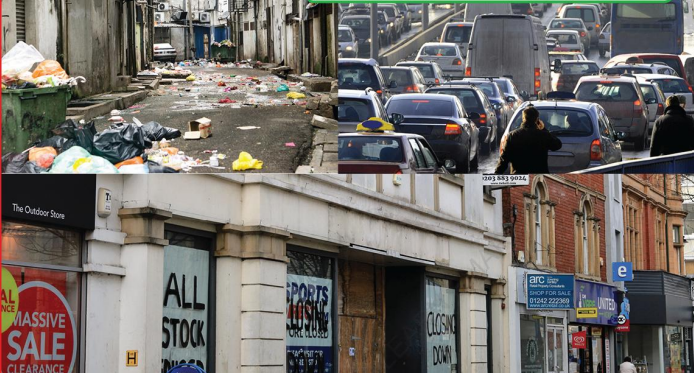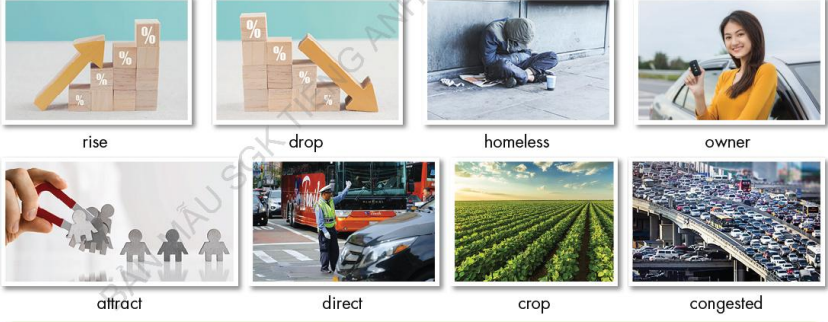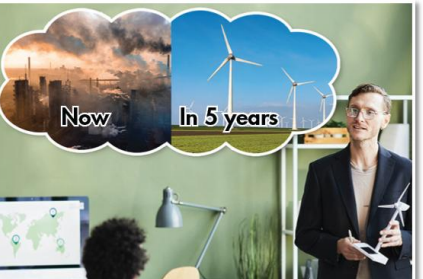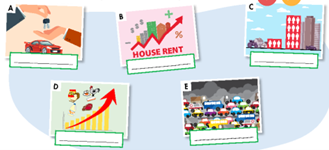Giải SGK, SBT Unit 7. Urban life iLearn Smart World
Giải SGK, SBT Unit 7 iLearn Smart World
Past Continuous
|
Affirmative I was riding my bike while he was riding the bus. You were shopping for two hours yesterday. He/She/It was riding the train at 5 p.m. last Friday. We/You/They were playing when we saw some trash. |
Negative I was not walking to school while you were sleeping. You were not riding the bus all day today. He/She/It was not working at 7 p.m. yesterday.
We/You/They were not driving when we/you/they saw the dog. |
|
Yes/No questions Was I cycling while you were walking? Were you eating at 7 p.m. yesterday? Was he/she/it dining at 7 p.m. yesterday? Were we/you/they building when the rain started? |
Short answers Yes, you were. No, you weren't. Yes, I was. No, I wasn't. Yes, he/she/it was. No, he/she/it wasn't. Yes, we/you/they were. No, we/you/they weren't. |
|
Wh-questions What were you doing all day last Saturday? Where were you eating at 6 p.m. last night? Who was he/she/it talking to while I was driving? |
Note: We use when for a past action in progress when an action in the Past Simple interrupted it, and while to talk about two or more actions in progress at the same time in the past. |
Tạm dịch
|
Affirmative (Khẳng định) I was riding my bike while he was riding the bus. (Tôi đang đạp xe còn anh ấy đang đi xe buýt.) You were shopping for two hours yesterday. (Hôm qua bạn đã mua sắm suốt hai tiếng đồng hồ.) He/She/It was riding the train at 5 p.m. last Friday. (Anh ấy/Cô ấy/Nó đang đi tàu lúc 5 giờ chiều thứ sáu tuần rồi.) We/You/They were playing when we saw some trash. (Chúng tôi/Bạn/Họ đang chơi thì chúng tôi nhìn thấy một số rác.) |
Negative (Phủ định) I was not walking to school while you were sleeping. (Tôi đã không đi bộ đến trường khi bạn đang ngủ.) You were not riding the bus all day today. (Hôm nay bạn đã không đi xe buýt cả ngày.) He/She/It was not working at 7 p.m. yesterday. (Anh ấy/Cô ấy/Nó không làm việc lúc 7 giờ tối hôm qua.)
We/You/They were not driving when we/you/they saw the dog. (Chúng tôi/Bạn/Họ không lái xe khi chúng tôi/bạn/họ nhìn thấy con chó.) |
|
Yes/No questions (Câu hỏi yes/no) Was I cycling while you were walking? (Tôi đã đạp xe trong khi bạn đang đi bộ phải không?) Were you eating at 7 p.m. yesterday? (Bạn có ăn lúc 7 giờ tối không hôm qua không?) Was he/she/it dining at 7 p.m. yesterday? (Anh ấy/cô ấy/nó đang ăn tối lúc 7 giờ tối hôm qua không?) Were we/you/they building when the rain started? (Có phải chúng tôi/bạn/họ đang xây dựng khi trời bắt đầu mưa không?) |
Short answers (câu trả lời ngắn) Yes, you were. No, you weren't. (Đúng, bạn đúng rồi. Không, bạn không đúng) Yes, I was. No, I wasn't. (Đúng rồi. Không, tôi không.) Yes, he/she/it was. No, he/she/it wasn't. (Đúng, anh ấy/ cô ấy/ nó đúng. Không, anh ấy/ cô ấy/ nó không) Yes, we/you/they were. No, we/you/they weren't. (Đúng, chúng ta/ họ/ đúng. Không, chúng ta/ họ không)
|
|
Wh-questions (Câu hỏi Wh-) What were you doing all day last Saturday? (Bạn đã làm gì cả ngày thứ Bảy tuần trước?) Where were you eating at 6 p.m. last night? (Bạn đã ăn ở đâu vào lúc 6 giờ chiều tối hôm qua?) Who was he/she/it talking to while I was driving? (Anh ấy/cô ấy/nó đang nói chuyện với ai khi tôi đang lái xe?) |
Note: (Lưu ý) We use when for a past action in progress when an action in the Past Simple interrupted it, and while to talk about two or more actions in progress at the same time in the past. (Chúng ta sử dụng When cho một hành động trong quá khứ đang diễn ra khi một hành động ở Quá khứ đơn làm gián đoạn nó và while để nói về hai hoặc nhiều hành động đang diễn ra cùng lúc trong quá khứ.) |
c. Fill in the blanks with the correct form of the verbs.
(Điền vào chỗ trống với dạng đúng của động từ.)
1. My mom was waiting for us to come home at 7 p.m. last night.
(Mẹ tôi đang đợi chúng tôi về nhà lúc 7 giờ tối tối hôm qua.)
2. We _______ (travel) to Vũng Tàu for a holiday when we _______ (see) an accident.
3. For years, pedestrians _______ (cross) anywhere they wanted to because there weren't any crosswalks.
4. I _______ (tell) my mom about the new sports center while my dad _______ (drive) us to the restaurant.
5. Everyone _______ (sit) quietly on the bus when a woman _______ (start) having a very loud phone call.
b. Make two more conversations using the ideas on the right.
(Thực hiện thêm hai cuộc trò chuyện bằng cách sử dụng các ý tưởng ở bên phải.)
|
walking to school I saw an accident
A pedestrian wasn't looking, and a bike didn't stop at the crosswalk.
The pedestrian was looking at her phone when she got hit.
I helped the woman. She got hurt pretty badly.
kind of you
Thanks - ban using phones when walking. It's dangerous. |
reading in the park something funny happened
A man was having a loud phone call with his wife.
Then an older woman walked to him and said "Shh! You're loud!"
He got uncomfortable and hung up.
Funny
Yeah - encourage people to use their phones quietly |
Tạm dịch
|
walking to school I saw an accident (đi bộ tới trường Tôi đã chứng kiến một vụ tai nạn) A pedestrian wasn't looking, and a bike didn't stop at the crosswalk. (Người đi bộ không để ý và xe đạp không dừng lại ở lối qua đường dành cho người đi bộ.) The pedestrian was looking at her phone when she got hit. (Người đi bộ đang xem điện thoại thì bị tông.) I helped the woman. She got hurt pretty badly. (Tôi đã giúp người phụ nữ đó. Cô ấy bị thương khá nặng.) kind of you (bạn thật tốt bụng) Thanks - ban using phones when walking. It's dangerous. (Cảm ơn - cấm sử dụng điện thoại khi đi bộ. Nó rất nguy hiểm.) |
reading in the park something funny happened (đọc sách trong công viên có điều gì đó buồn cười đã xảy ra) A man was having a loud phone call with his wife. (Một người đàn ông đang nói chuyện điện thoại ầm ĩ với vợ mình.) Then an older woman walked to him and said "Shh! You're loud!" (Sau đó, một người phụ nữ lớn tuổi bước đến gần anh ấy và nói "Suỵt! Anh ồn ào quá!") He got uncomfortable and hung up. (Anh cảm thấy khó chịu và cúp máy.)
Funny (Buồn cười) Yeah - encourage people to use their phones quietly (Có - khuyến khích mọi người sử dụng điện thoại một cách im lặng.) |
b. Make two more conversations using the ideas on the right.
(Thực hiện thêm hai cuộc trò chuyện bằng cách sử dụng các ý tưởng ở bên phải.)
|
Lots of businesses are closing
Businesses are closing so quickly
help more people start businesses
attract new factories to the area
factories create jobs, and more people will move here We're damaging the land badly
it's such a big problem- anywhere to grow crops soon
ban plastic products
|
The buses are getting very old
They're getting so old
buy some new ones soon
build a subway system
we won't need so many buses
The city’s population is dropping quickly
it's dropping so quickly- enough people to work
attract more young people to the area. |
Tạm dịch
|
Lots of businesses are closing (Nhiều doanh nghiệp đóng cửa) Businesses are closing so quickly (Các doanh nghiệp đang đóng cửa rất nhanh) help more people start businesses (giúp nhiều người bắt đầu kinh doanh hơn) attract new factories to the area (thu hút các nhà máy mới vào khu vực) factories create jobs, and more people will move here (các nhà máy tạo việc làm và nhiều người sẽ chuyển đến đây) We're damaging the land badly (Chúng ta đang tàn phá đất đai một cách tồi tệ) it's such a big problem- anywhere to grow crops soon (đó là một vấn đề lớn- ở bất cứ nơi nào có thể sớm trồng trọt) ban plastic products (cấm sản phẩm nhựa) |
The buses are getting very old (Những chiếc xe buýt đang trở nên cũ kỹ) They're getting so old (Chúng đang cũ đi rất nhiều) buy some new ones soon (mua một số cái mới sớm) build a subway system (xây dựng hệ thống tàu điện ngầm) we won't need so many buses (chúng ta sẽ không cần quá nhiều xe buýt)
The city’s population is dropping quickly (Dân số thành phố đang giảm nhanh)
it's dropping so quickly- enough people to work (nó đang giảm rất nhanh- đủ người để làm việc) attract more young people to the area. (thu hút nhiều người trẻ đến khu vực này.) |
|
Writing Skill (Kỹ năng viết) Writing body paragraphs for chain problem and solution passages (Viết đoạn văn thân bài cho đoạn văn về vấn đề và giải pháp theo chuỗi) To write a good body paragraph for a chain problem and solution passage, you should: (Để viết một đoạn văn thân bài hay cho đoạn văn về vấn đề và giải pháp theo chuỗi, bạn nên:) 1. Introduce the problem. (Giới thiệu vấn đề.) One problem is that there is too much litter. (Một vấn đề là có quá nhiều rác thải.) Another problem is the lack of houses. (Một vấn đề khác là thiếu nhà ở.) 2. Give more details about the effect of the problem. (Cung cấp thêm chi tiết về tác động của vấn đề.) For this reason, people won't go to the parks. (Vì lý do này, mọi người sẽ không đến công viên.) Because of this, there will be more homeless people. (Vì lý do này, sẽ có nhiều người vô gia cư hơn.) 3. Give a solution to the problem. (Đưa ra giải pháp cho vấn đề.) The government should organize a park clean-up. We should build more apartments. (Chính phủ nên tổ chức dọn dẹp công viên. Chúng ta nên xây dựng thêm nhiều căn hộ.) Note: In chain problem and solution passages, we only talk about one problem in each body paragraph. (Lưu ý: Trong đoạn văn về vấn đề và giải pháp theo chuỗi, chúng ta chỉ nói về một vấn đề trong mỗi đoạn văn thân bài.) |
Read the sentences and write P for introducing a problem, D for extra details, or S for giving a solution.
(Đọc các câu và viết P để giới thiệu vấn đề, D để biết thêm chi tiết hoặc S để đưa ra giải pháp.)
1. The city should install more trash cans along the riverside.
(Thành phố nên lắp đặt nhiều thùng rác hơn dọc theo bờ sông.)
2. Because of this, there is more pollution in the rivers.
(Vì lý do này, ô nhiễm ở các con sông ngày càng tăng.)
3. The issue is getting so bad that animals living in the river will die.
(Vấn đề đang trở nên tồi tệ đến mức các loài động vật sống ở sông sẽ chết.)
4. The biggest issue is that people are throwing trash in the river.
(Vấn đề lớn nhất là mọi người đang vứt rác xuống sông.)
5. For this reason, we should volunteer for a clean-up.
(Vì lý do này, chúng ta nên tình nguyện dọn dẹp.)
6. Another problem is that there aren't enough workers to clean up.
(Một vấn đề khác là không có đủ công nhân để dọn dẹp.)
Think of a name for a city and write it in the box. Choose two problems, a future effect, and a solution for each and complete the table.
(Nghĩ ra tên một thành phố và viết vào ô. Chọn hai vấn đề, một ảnh hưởng trong tương lai và một giải pháp cho mỗi vấn đề và hoàn thành bảng.)
|
City name: . (Tên thành phố) |
||
|
Problems (Vấn đề) |
Future effects (Ảnh hưởng tương lai) |
Solutions (Giải pháp) |























